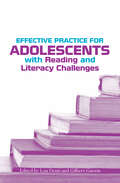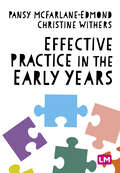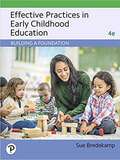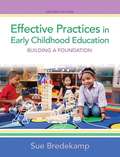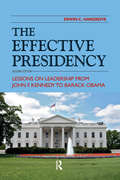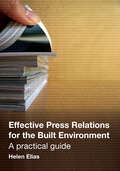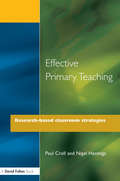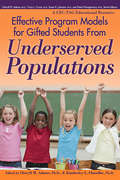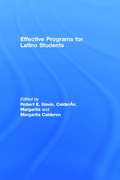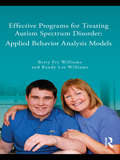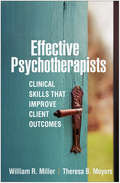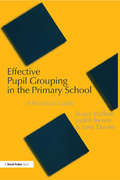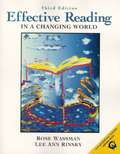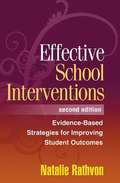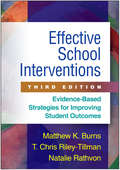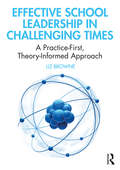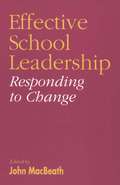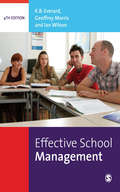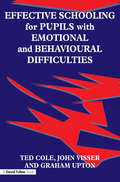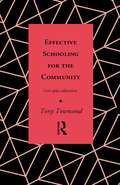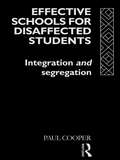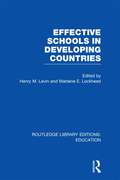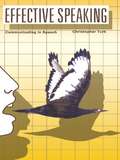- Table View
- List View
Effective Practice for Adolescents with Reading and Literacy Challenges
by Lou Denti Gilbert GuerinLack of reading proficiency is a barrier to understanding the academic content of any discipline. Effective Practice for Adolescents with Reading and Literacy Challenges provides secondary teachers with the knowledge and the strategies they need to improve their students' reading skills. Editors Denti and Guerin present a comprehensive collection of articles by a selection of prominent literacy and education researchers that provide practical approaches to improving literacy and offer accounts of successful evidence-based programs and practices that can be tailored to the needs of teachers working with struggling readers. Each chapter includes questions for review, a list of web resources, and suggested small group activities to encourage implementation of chapter ideas and strategies, making Effective Practice for Adolescents with Reading and Literacy Challenges a valuable tool for all teachers, regardless of content area.
Effective Practice in the Early Years
by Pansy McFarlane-Edmond Christine WithersEffective Practice in the Early Years supports students of degrees and foundation degrees in Early years, Early Childhood and related disciplines studying professional practice in the early years. *Focused on the knowledge and learning students need for all practice focused, professional practice and placements modules. *Supports students with their written assignments and assessments linking theory and practice. *Includes case studies, reflective tools, template examples and explores good practice. *Offers practical support and guidance for students working and learning in early years settings.
Effective Practice in the Early Years
by Pansy McFarlane-Edmond Christine WithersEffective Practice in the Early Years supports students of degrees and foundation degrees in Early years, Early Childhood and related disciplines studying professional practice in the early years. *Focused on the knowledge and learning students need for all practice focused, professional practice and placements modules. *Supports students with their written assignments and assessments linking theory and practice. *Includes case studies, reflective tools, template examples and explores good practice. *Offers practical support and guidance for students working and learning in early years settings.
Effective Practices In Early Childhood Education: Building A Foundation
by Sue BredekampProvide the building blocks for understanding effective practices in early childhood education Inspired by her own classroom experiences, Sue Bredekamp designed Revel Effective Practices in Early Childhood Education: Building a Foundation to empower a new generation of teachers who can make a difference in children’s lives. An entire chapter introduces readers to developmentally appropriate practices (DAP) for early childhood education. Subsequent chapters are organized according to the NAEYC guidelines, which Bredekamp has co-authored for over 30 years. Building on the DAP framework, Bredekamp focuses on three themes that are essential to quality teaching: intentional teaching, developmentally appropriate curriculum, and evidence-based, effective practices. The 4th Edition introduces a new theme, the importance of developing children’s executive function, self-regulation, and positive approaches to learning. Expanded discussions of ways to support and protect the role of play in children’s education, a completely revised chapter on STEM teaching and learning, and a greater focus on culturally responsive curriculum keep readers up to date on the dynamic field of early education. <p><p> Effective Practices in Early Childhood Education, 4th Edition is also available via Revel™, an interactive learning environment that enables students to read, practice, and study in one continuous experience.
Effective Practices in Early Childhood Education: Building a Foundation (Second Edition)
by Sue BredekampSue Bredekamp, one of the foremost authorities in the field of early childhood education, is author of Effective Practices in Early Childhood Education: Building a Foundation, now in its Second Edition. At its core, this intriguing text provides the building blocks for understanding effective practices in early childhood education. Building upon the Developmentally Appropriate Practice framework that she conceptualized, Sue Bredekamp shows how effective teaching practices can make a difference in the lives of young children. Written with a clear and engaging presentation, the author designed the book to prepare a new generation of early childhood professionals by remaining keenly focused on the three core themes threaded throughout: intentional teaching, challenging and interesting curriculum, and evidence-based, effective practices for a new generation of early childhood educators. The Enhanced Pearson eText features embedded video. Improve mastery and retention with the Enhanced Pearson eText* The Enhanced Pearson eText provides a rich, interactive learning environment designed to improve student mastery of content. The Enhanced Pearson eText is: Engaging. The new interactive, multimedia learning features were developed by the authors and other subject-matter experts to deepen and enrich the learning experience.
Effective Presidency: Lessons on Leadership from John F. Kennedy to Barack Obama
by Erwin C. HargroveFirst Published in 2016. Routledge is an imprint of Taylor & Francis, an Informa company.
Effective Press Relations for the Built Environment: A Practical Guide
by Helen EliasThis practical guide explains to architects, engineers, designers and other consultants how to establish press plans for firms and for individual projects, and how to actively develop reputation by getting work published in the architectural, engineering and construction press. With quotes, advice and opinions from the industry's key journalists – including expert image generation and selection advice from Gareth Gardner, photo-journalist and past editor of FX and Features editor of Building Design – Effective Press Relations for the Built Environment, offers practical guidance on topics such as: how to approach planning a strategy for a project how to write, seek approval, build a target press list and issue the information to magazines how to speak to the press how to manage a crisis and handle bad press. With its hands-on approach and comprehensive publications, architectural photographers and PR consultants listings, this book is an invaluable tool for new starters, or larger firms that want to take a more pro-active role in generating their own publicity, while also helping practices to get the most from their press relations consultant.
Effective Primary Teaching: Research-Based Classroom Strategies
by Paul Croll Nigel HastingsEffective Primary Teaching: Research-Based Classroom Strategies by Paul Croll and Nigel Hastings.
Effective Program Models for Gifted Students from Underserved Populations
by Cheryll Adams Kimberley ChandlerEffective Program Models for Gifted Students From Underserved Populations provides coordinators, teachers, administrators, and other interested parties information about effective program models for underserved gifted students. The book highlights eight successful programs that have been designed to use with low-income, high-ability students. Each chapter focuses on a specific program and includes an introduction and brief overview of a model, how students are identified for the program, what talents are valued, the goals of the project, a description of the model, difficult issues and how they are addressed, important contributions of the program, research findings, how the program is sustained, and contact information.
Effective Programs for Latino Students
by Robert E. Slavin Margarita CalderLatino (or Hispanic) children are one of the fastest-growing groups in U.S. schools today. On average, these students perform worse than Anglo students on measures of academic achievement and other measures of academic success, and their drop-out rate is high. There are schools of excellence among those serving Latino children, but the majority of these children are placed "at risk" by schools and community institutions unable to build on the cultural, personal, and linguistic strengths these children are likely to bring with them to school. Schools serving Latino students need programs based on high-quality research, capable of being replicated and adapted to local circumstances and needs. The purpose of this book is to present the current state of the art with respect to research on effective instructional programs for Latino students in elementary and secondary grades. Surprisingly, this has not been done before; there are many books on the situation of Latino students in U.S. schools, but none so far have reviewed research on the outcomes of programs designed to enhance the academic achievement of these students. The chapters represent a broad range of methodologies, from experimental to correlational to descriptive, and the solutions they propose are extremely diverse. Each examines, in its own way, programs and practices that are showing success. Together, they present a rich array of research-based effective programs that are practical, widely available, and likely to make a profound difference. What binds the chapters together is a shared belief that Latino students can succeed at the highest levels if they receive the quality of instruction they deserve, and a shared belief that reform of schools serving many Latino students is both possible and essential. This is a book filled with statistics, description, and reviews of research--but even more, it is filled with optimism about what schools for Latino students can be, and what these students will achieve. It is a highly relevant and useful resource for educators, policymakers, and researchers who want to use research to inform the decisions they make about how to help Latino students succeed in elementary and secondary schools, and beyond.
Effective Programs for Treating Autism Spectrum Disorder: Applied Behavior Analysis Models
by Betty Fry Williams Randy Lee WilliamsEffective Programs for Treating Autism Spectrum Disorder is written for teachers, parents, and the many service providers who work with individuals with autism spectrum disorder (ASD). Part one reviews the characteristics of ASD, summarizes major theories and research findings regarding cause(s) of ASD, and discusses the most popular treatment claims, examining each approach's scientific base and value. Part two provides an informative overview of applied behavior analysis, focusing on the principles of learning and basic procedures based upon those principles. These two parts provide a foundation for understanding the strategies implemented by the outstanding treatment programs described in Part three. The eight models described in Part three represent comprehensive, evidence-based programs for the treatment of persons with ASD, from infancy through adulthood. Programs reviewed include the Lovaas Institute, Koegel Center, Strategic Teaching and Reinforcement Systems (STARS), Project DATA, New England Children's Center, May Institute, Princeton Child Development Institute, and Judge Rotenberg Center. Strategies explained include intensive early behavioral intervention, Pivotal Response Training, verbal behavior, script fading, social stories, visual activity schedules, functional analysis, the Picture Exchange Communication System, and the Family-Teaching Model.
Effective Psychotherapists: Clinical Skills That Improve Client Outcomes
by William R. Miller Theresa B. MoyersWhat is it that makes some therapists so much more effective than others, even when they are delivering the same evidence-based treatment? This instructive book identifies specific interpersonal skills and attitudes--often overlooked in clinical training--that facilitate better client outcomes across a broad range of treatment methods and contexts. Reviewing 70 years of psychotherapy research, the preeminent authors show that empathy, acceptance, warmth, focus, and other characteristics of effective therapists are both measurable and teachable. Richly illustrated with annotated sample dialogues, the book gives practitioners and students a blueprint for learning, practicing, and self-monitoring these crucial clinical skills.
Effective Pupil Grouping in the Primary School: A Practical Guide
by Susan Hallam Judy Ireson Jane DaviesThis book draws on new research exploring the practical experiences of schools and teachers who have used different kinds of grouping. Setting out the issues and discussing the strengths and weaknesses of different types of grouping, this book will help teachers decide which methods are most appropriate for their pupils. The authors offer step-by-step guidance to all aspects of grouping, including setting; streaming; within-class ability grouping; within-class mixed ability grouping; cross-age grouping; assessing and monitoring group placement; and how to implement different types of grouping. The book also discusses children's perceptions of the purposes of groups; moving between groups; and how to liaise with parents about their child moving groups. The book will be welcomed by trainees and teachers alike.
Effective Reading in a Changing World 3rd Edition
by Rose Wassman Lee Ann RinskySelected writings (essays, textbooks, and fiction)from a diverse group of award-winning journalists and authors.
Effective School Interventions, Second Edition
by Natalie Rathvon Paula FreerThis highly practical resource and text presents 70 interventions that have been demonstrated to improve the classroom learning environment, academic achievement, and student behavior and social competence. Each intervention is presented in a brief, standardized format with step-by-step procedures that can easily be implemented by Pre-K-12 teachers and other school-based professionals. The volume includes best-practice guidelines for designing, implementing, and evaluating evidence-based school interventions, as well as strategies for combining multiple interventions to create a comprehensive program at the individual, class, or school wide level. New to This Edition Substantially revised and expanded to reflect significant developments in research and practice. Designed for full compatibility with a response-to-intervention framework.42 of the 70 interventions are entirely new. More in-depth discussions of intervention procedures facilitate implementing and adapting the techniques. A new chapter on preschool interventions. Expanded coverage of curriculum-based measurement procedures. A new category of proactive interventions targeting positive relationships in the classroom.
Effective School Interventions: Evidence-Based Strategies for Improving Student Outcomes
by Natalie Rathvon Matthew K. Burns T. Chris Riley-TillmanThis indispensable course text and practitioner resource, now fully revised, has helped tens of thousands of readers implement evidence-based interventions to improve students' academic achievement and behavior in PreK–12. The volume presents best-practice guidelines and step-by-step procedures for 83 interventions that can easily be implemented by teachers and other school-based professionals. It is a go-to book for those working in a multi-tiered system of support (MTSS) or response-to-intervention (RTI) framework. User-friendly features include recommended print and online resources and 10 reproducible forms. Purchasers get access to a webpage where they can download and print the reproducible materials in a convenient 8 1/2" x 11" size. New to This Edition: *Updated throughout to reflect current research-based best practices. *20 new interventions. *Chapter on important skills for intervention success. *The intensity of each intervention (classwide, small-group, and/or individual) is now specified. *Behavior chapter has been reorganized for easier use. *Downloadable reproducible tools.
Effective School Leadership in Challenging Times: A Practice-First, Theory-Informed Approach
by Liz BrowneEducation leadership has been subject to a period of turmoil with rapid social change, political demands for excellence, economic pressures for austerity and the influence of technology impacting on leadership roles in multiple ways. This book draws on real examples of practice to identify the key challenges facing educational leadership and how these might be overcome drawing on recent research and interventions that have impacted positively on learner outcomes and teacher retention. Covering all aspects of leadership including school improvement, vision and values, working with partners and leading change, the book launches the concept of atomic leadership, advocating small steps to change for maximum momentum and large-scale impact. It reveals how leaders can cooperate to trial new ways of learning and disseminate their successes and failures with a new honesty and openness about what works in our schools. With reflective tasks in every chapter, this text will inspire debate and inform discussion at staff meetings and is essential reading for all school leaders as well as those undertaking master-level courses in educational leadership and or pursuing the National Professional Qualifications in leadership.
Effective School Leadership: Responding to Change (Administration And Leadership Ser.)
by John MacBeath`This is a zippy read arising out of the international project "effective leadership in a time of change", which grapples with the nature and practice of leadership (as opposed to management or administration) in schools′ - Times Educational Supplement Who really runs the school - head teachers or governors? What do pupils think of their leaders and should they have a bigger role in school leadership? Is the United Kingdom obsessed with discipline and `strong leadership′ as others suggest? Is New Public Management an insidious undermining of what is important and valuable in the UK educational system? The answers to these and other questions present surprises and challenges to the way things are seen in the UK. This book provides evidence from other countries that raises many questions about effective leadership and how it is seen from different viewpoints, and examines the issues in a political context and in relation to a changing world scene.
Effective School Management (1-off Ser.)
by Ian Wilson Geoff Morris K. B. Everard`This edition is more focussed on the leadership demands of managers both within the school and its community. This book can be used as a source of reference for anyone on a school manager position, written by people who practice management on educational organizations themselves, it deals with the fundamentals of what management is the many roles of the manager' - Headteacher Update `The book is clearly structured, with an informative table to contents. Each chapter ends with practical tasks which could be sued either by an individual at home or by groups in a training session. The book is worth adding to any staffroom library for the section of "time-management techniques" alone. If only I has acquired the habit of "starting each day by writing list of all the things that should be done that day and starring them to indicate importance" in recognition that "the critical distinction is between what is urgent and what is important"!' - Education Review `This book provides a thoroughly comprehensive guide to managing staff, meetings, motivating people, managing conflict, health and safety and much more' - Nursery Equipment This popular book has been thoroughly updated for its Fourth Edition. Targeting the contents directly to the needs of today's school manager. The book is now even more directed towards the leadership demands on managers, both within the school and in its community setting. New sections have been written to deal with emerging pressures on heads: - the increasing complexity of employment legislation - the management of risk - performance management - flexibility in the curriculum - the inclusion agenda - team development and leadership - the effect of the government's new approach to early years education. Recent research and developments have been incorporated and the content has been extensively updated. The authors' fresh and readable style, coupled with their use of proven interactive exercises, makes the book a first choice for busy heads and senior staff in all schools.
Effective Schooling for Pupils with Emotional and Behavioural Difficulties
by John VisserFirst Published in 1998. Routledge is an imprint of Taylor & Francis, an informa company.
Effective Schooling for the Community: Core-Plus Education (Educational Management Ser.)
by Tony TownsendThis book offers a new perspective on the management of schools by bringing together the knowledge and understanding of school effectiveness and community education. Tony Townsend argues that the core activity of the school, to provide a learning environment for children, should be supplemented by educational activities that service the needs of the community as a whole. He offers a model for the development of the `core-plus' school, including practical ideas for school leaders to build strategies for improving school programme possiblities and processes to encourage greater community involvement.
Effective Schools for Disaffected Students: Integration and Segregation
by Paul CooperDisaffected pupils respond well in circumstances where they feel secure, where they have a sense of being valued and respected, and where they perceive there to be opportunities for them to succeed. Effective Schools for Disaffected Students offers insights into how these outcomes might be achieved in both mainstream and segregated settings. The investigation is based on the views of pupils who have been excluded from mainstream schools for pupils with emotional and behavioural difficulties. The author relates the pupils' experiences of the different types of school to research in the area of school effectiveness. He offers some practical guidelines on ways in which teachers and managers can work towards reducing disaffection in schools within the real life contexts in which they occur. The book will appeal to anybody whose concerns are with the everday realities of schooling.
Effective Schools in Developing Countries (Routledge Library Editions: Education #Vol. 15)
by Henry M. LevinThis volume brings together eight case studies which describe a variety of initiatives to create more effective schools for children of poverty, especially in the Third World. The initiatives reviewed published and unpublished documents and both qualitative and statistical studies were examined. Countries include Brazil, Burundi, Colombia, Ghana, Nepal, Sri Lanka, Thailand and the United States. Each initiative was developed independently to address unique challenges and situations but taken as a group, the features of the approaches described in this volume can be viewed as a basis for considering the development of effective schools strategies in other contexts.
Effective Speaking: Communicating in Speech
by Christopher TurkEffective Speaking provides the hard scientific information about audience psychology, text preparation, presentation methods, voice production, body language and persuasive advocacy which will help would-be speakers improve their performance. The emphasis throughout is on practical self-help, on methods which have been shown to work, with clear explanations of just why they are effective.
Effective Strategies for Teaching in K-8 Classrooms
by Jacqueline Hansen Kenneth D. MooreFeaturing a wealth of reflection activities and connections to standards, this concise, easy-to-read teaching methods text equips students with the content knowledge and skills they need to become effective K–8 teachers. The book maximizes instructional flexibility, reflects current educational issues, highlights recent research, and models best pedagogical practices. Current and realistic examples, a section in each chapter on using technology in the classroom, and material on differentiating instruction for diverse learners—including students with special needs and English language learners—make this a must-have resource for any K–8 teacher.
